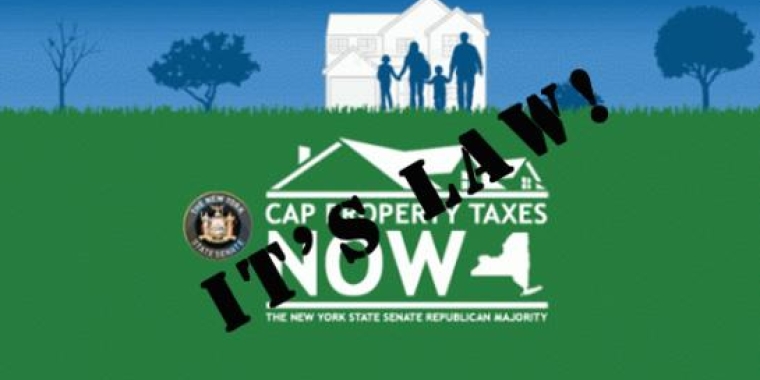
State Senate Passes Landmark Property Tax Cap Legislation
Joseph A. Griffo
June 27, 2011
-
ISSUE:
- Local Government
- Taxes
- Property Tax

Griffo Hails Senate Passage of Property Tax Cap Legislation as a Landmark
Bill Also Provides for Mandate Relief
(Albany) - Calling it a landmark step to reverse a culture of spending money taxpayers do not have, Senator Joseph A. Griffo (R-C-IP, Rome) today announced that he has achieved his long-held goal of securing passage of a tax cap coupled with mandate reform that will limit property tax increases and set the stage for economic revitalization across New York.
Senate bill #5856 will cap school and local government taxes to less than two percent or the Consumer Price Index (CPI), whichever is lower. Mandate relief is also included, with $127 million in savings to local governments, in addition to the creation of a Mandate Relief Council to identify and repeal unsound, unduly burdensome laws and regulations.
“The biggest tax crisis in my 47th District is the crushing burden of skyrocketing property taxes that go up and up with no end in sight,” Griffo said. “Today, I have worked with the Senate to take a major first step forward to implement tax relief through legislation that will curb the costly spiral of tax increases. The message from the people who pay layer after layer of taxes has been clear: They cannot afford to have unchecked increases eroding their financial condition. Employers responded to sky-high taxes by voting with their feet, creating stagnation and decline across New York’s economy. The bottom line is simple: New York tried to spend and tax its way to a brighter future, and it failed miserably. I am pleased to have supported tax cap legislation for several years, and I believe today we are moving in the direction long needed by the people of New York.”
This tax levy cap would shift the focus from total spending to the actual property taxes levied to support school district and local government expenses. The bill includes the following provisions:
- This bill limits tax levy growth to the lesser of two percent or the annual increase in the CPI, other than the “Big 5” school districts of Buffalo, Rochester, Syracuse, Yonkers and New York City. Those are funded through city budgets.
- The exceptions for a tax levy above two percent or CPI are funds needed to support voter-approved capital expenditures, pensions, torts over five percent of the prior year’s levy, and an override of the cap.
- This bill also allows the growth in the levy due to physical and quantitative change.
- A school district would be required to submit a tax levy proposition for approval by voters at the district's annual meeting on the 3rd Tuesday in May. If the proposed tax levy is within the district's tax levy limit, then a majority vote would be required for approval. If the proposed tax levy seeks to override the cap and exceeds the district's tax levy cap, the threshold required for approval would be 60 percent of the vote.
- A school district that does not levy an amount up to the cap in any one year would be allowed to carry over unused tax levy capacity into future years. However, this carryover levy capacity cannot be used to increase its tax levy by more than an additional 1.5 percent above the cap in any single year.
- In the event a district's actual tax levy exceeds its authorized levy due to clerical or technical errors, the erroneous excess levy must be placed in reserve to offset the levy for the next school year.
Griffo, a long-time supporter of reduced state spending through fiscal restraint, said that New Yorkers deserve long-term protection from free-spending politicians. “The spending cap needed to be put in place to protect New Yorkers for years to come. The staggering size of the state’s deficit should be a lesson that state government cannot spend its way to finding a solution to the issues that face New Yorkers,” Griffo said. “The only way to be sure the state spends less money is to adopt a spending cap that will eliminate increases that taxpayers cannot afford.”
Griffo said that although he believes mandate relief will need to ultimately slice even deeper into the endless layers of red tape smothering schools and local government, the mandate relief in the bill is a major step forward. “State government has been piling mandates upon schools and local government for 30 or 40 years,” Griffo said. “That’s not going to be fully dismantled in a few weeks’ time. I fully expect that follow-up mandate relief proposals will be necessary to fully implement our intentions of streamlining government spending at all levels. However, this is a landmark event because it represents a rollback of mandates and a victory for the people who have to pay for these costly, burdensome regulations – our property taxpayers.”
Griffo said the legislation will improve New York’s image. “The challenge from business leaders has been to show New York was serious about making the state competitive for private investment. We have done that. We have set the stage for job growth in New York, and we have addressed the crushing burden that comes when taxes rise faster than anyone’s ability to pay them. This is a major step forward for Albany, and I am proud to have taken a lead in supporting the tax cap and mandate reform throughout my service as a Senator.”
The bill also provides for the same cap to apply to taxes levied by municipal governments. Local governments that do not levy an amount up to the cap in one year can rollover that amount up to 1.5 percent in the following year. Local boards can exceed the cap with a 60 percent vote of the governing body. Exceptions include the pension and tort judgments in excess of five percent from the prior year’s levy. When enacted, the law would take effect for the 2012-13 fiscal year.
In addition, the mandate relief component would provide real cost savings in the form of $127 million in savings to local budgets. This includes:
- $70 million for all local governments and school districts through piggy-backing and centralized contracts;
- $34.6 million in savings for school districts;
- $13 million for transportation/housing/contracting/procurement/administration for all localities;
- $7.9 million in social services savings for counties; and
- $1.5 million in criminal justice savings.
The bill also establishes a Mandate Relief Council which will:
- Determine if a statute or regulation is unsound, unduly burdensome, or costly;
- Establish procedures for repealing unfunded mandates in both statute and regulation;
- Provide a mechanism for direct appeals from the State Administrative Procedures Act petition;
- Require the state Comptroller to issue a detailed report on the cost and effect of unfunded mandates;
- Require that all bills that require a local government or a school or special district to take any action contain a fiscal note; and
- Be comprised of 11 members nominated by the Governor and Legislature: two nominations for each of the legislative leaders, and seven nominations for the Governor, including the Secretary to the Governor (who would serve as chair), the Governor’s Counsel, Secretary of State, Director of the Division of Budget, and three additional members from the Governor’s executive chamber staff.

